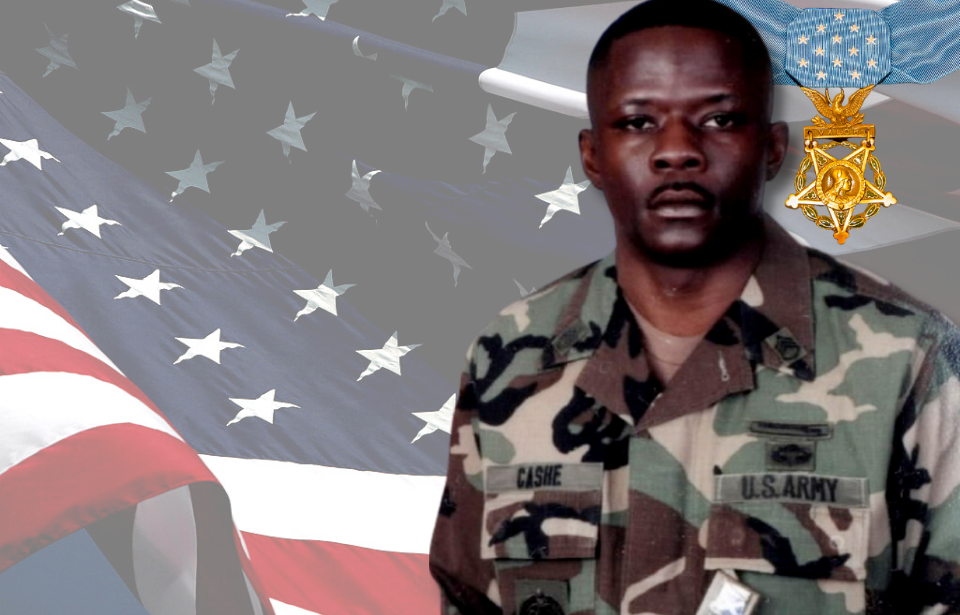The Medal of Honor stands as the U.S. Army’s highest tribute to valor in combat, and Sergeant First Class Alwyn Cashe earned this distinction through unmatched courage and sacrifice. When an IED struck his Bradley Fighting Vehicle in Iraq, Cashe’s uniform was soaked in fuel and soon engulfed in flames. Despite the agony and danger, he refused to retreat.
Time and again, he charged back into the burning wreckage—first pulling out the driver, then rescuing trapped soldiers one by one, even as his own body burned. His actions saved several lives before he collapsed from his injuries.
Cashe endured weeks in critical condition before passing away, but his final moments reflected the purest form of heroism: a soldier placing his brothers-in-arms above himself. His name now stands among the nation’s greatest heroes, forever honored for courage beyond measure.
Military service prior to the War in Iraq
Alwyn Cashe enlisted in the US Army in 1989, immediately after graduating high school. His early service included a two-year tour in Korea, followed by deployment during the Gulf War. Afterward, he spent three years stationed at Fort Lewis, Washington, before returning to Korea in 1993 for another year as an infantryman. He later became a squad leader at Fort Hood, Texas, and went on to serve two additional years in Germany.
In 1998, Cashe graduated from Drill Sergeant School and dedicated the next two years to training new recruits at Fort Benning, Georgia. By 2001, he had taken on a new challenge in Europe as an operations noncommissioned officer with the 19th Battlefield Coordination Detachment. He later assumed command of a squad within the 1st Battalion, 18th Infantry Regiment, further refining the leadership qualities that would define his career.
Cashe became a platoon sergeant in the 3rd Brigade, 3rd Infantry Division at Fort Benning in April 2004.
Operation Iraqi Freedom
Sergeant First Class Alwyn Cashe served two tours in Iraq, the first during the 2003 invasion and the second during Operation Iraqi Freedom. During his second deployment, he served with A Company, 1st Battalion, 15th Infantry Regiment, 3rd Infantry Division.
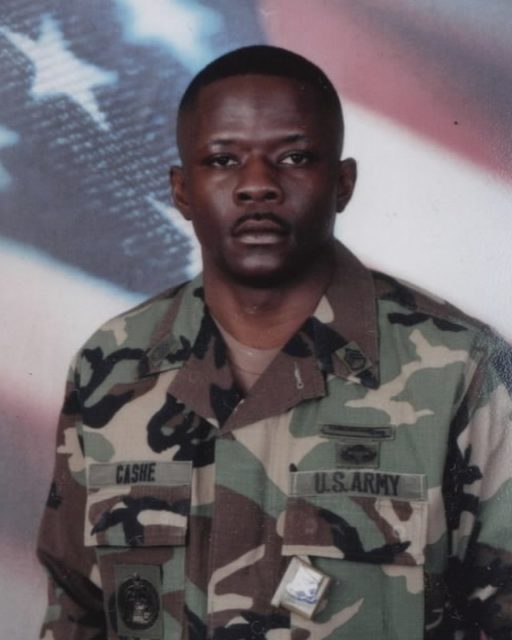
On the evening of October 17, 2005, Cashe’s unit set out on a routine clearance patrol, preparing for another convoy that was scheduled to pass through the area the following day. Although a dust storm was sweeping through the region, the mission was intended to be “a standard drive down to the bridge, make sure the route was clear, hang out for a bit, and drive right back,” with the exception that only two of the three Bradley Fighting Vehicles were able to participate.
Cashe’s Bradley was leading the convoy when it hit a roadside IED. The explosion ruptured the vehicle’s fuel cell, spraying those inside with fuel, and damaged the cargo hatch’s opening mechanism. Cashe, who was only lightly injured, managed to crawl out through the gunner’s hatch.
Six soldiers were trapped inside the vehicle, which was quickly consumed by flames. Despite his uniform being soaked in fuel, Cashe rescued the soldiers and removed the body of an Iraqi translator who had been killed in the blast.
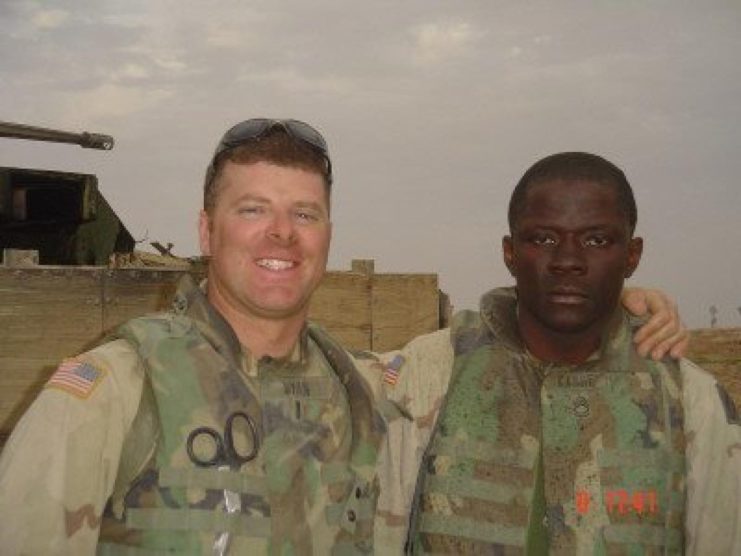
During the rescue, Cashe suffered second and third-degree burns to 72 percent of his body. He and the injured were medivaced to a nearby Iraqi military hospital, and he was later transported to Brooke Army Medical Center, Fort Sam Houston, Texas, where he succumbed to his injuries on November 8, 2005.
For his actions, he was nominated for the Silver Star by his battalion commander, Lieutenant General Gary Brito.
Road to the Medal of Honor
The effort to upgrade Sgt. 1st Class Cashe’s Silver Star to the Medal of Honor was initiated by Lt. Gen. Brito, who initially was unaware of the severity of Cashe’s injuries since the witnesses had been evacuated for medical care. Upon gaining a deeper understanding of Cashe’s actions, Brito provided additional statements to the Army to advocate for posthumously awarding him the honor.
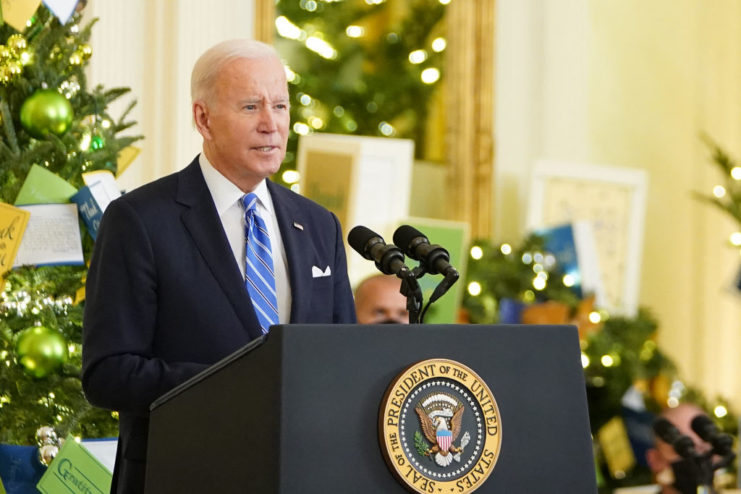
The push to upgrade Cashe’s Silver Star started again in October 2019, led by retired Navy SEAL Dan Crenshaw, Stephanie Murphy (D-FL) and former Special Forces officer Michael Waltz. They sent a letter to Secretary of Defense Mark Esper and Army Secretary Ryan McCarthy, urging them to approve the change.
Murphy took additional steps by introducing Bill HR 8276 in the U.S. House of Representatives. This bill removed the five-year time limit for Medal of Honor eligibility and gave the President the authority to award the medal “for acts of valor during Operation Iraqi Freedom.” The House passed the bill with full support on September 22, 2020, and the Senate approved it a little over a month later.
On December 3, 2020, President Donald Trump signed it into law.
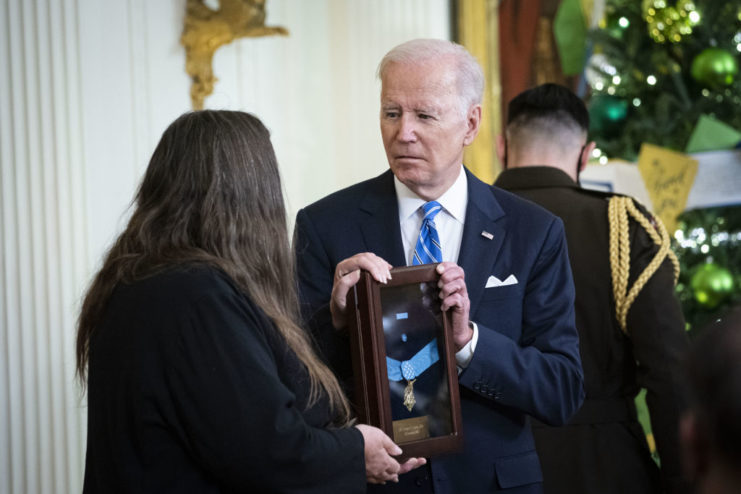
On December 16, 2021, Cashe’s widow, Tamara, accepted the Medal of Honor on his behalf from President Joe Biden at a ceremony honoring him and two other service members, Sergeant First Class Christopher Celiz and Master Sergeant Earl Plumlee. He was the seventh soldier from Operation Iraqi Freedom to receive the honor and the first African-American since the Vietnam War.
Speaking at the ceremony, President Biden called him “a soldier’s soldier” and “a man who literally walked through fire for his men.”
